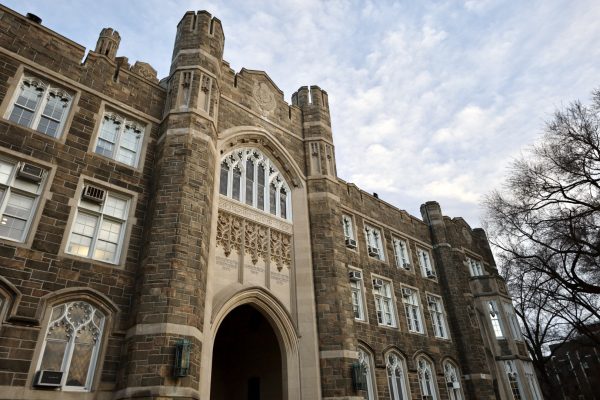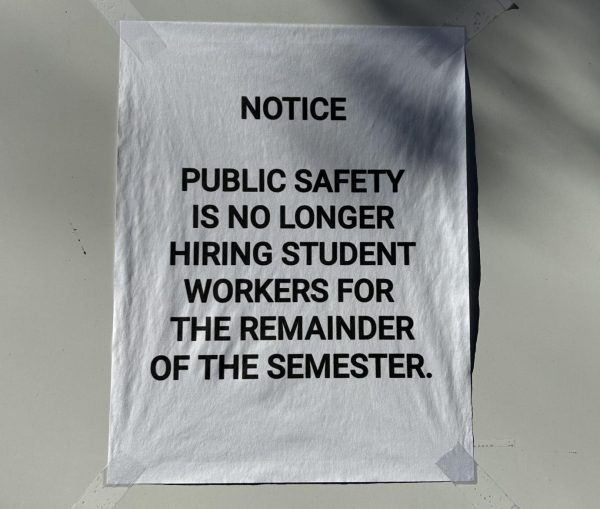New Test-Optional Admissions Policy Addresses Matters of Equity and Access
In an email on May 6, the Office of Undergraduate Admission announced it would no longer require applicants to submit standardized test scores (ACT and SAT) as part of the university’s admissions process. The test optional policy will be instituted for classes entering in Fall 2021 and Fall 2022 and will run for a two-year trial period.
“We are hopeful that two (admissions) cycles will provide us both sufficient experience with executing this new approach and some data points to draw meaningful conclusions about whether the policy is serving the University and our applicants well,” said John Buckley, vice president for Admission and Student Financial Services. “When we revisit the policy, both qualitative and quantitative aspects of the policy will be considered.”
According to Buckley, applicants who do not submit test scores will be considered on an “equal basis” as those who do, although the option to submit scores would allow students who have done well on standardized tests to present their results. He said the Office of Admission will make it very clear in all communications that testing is optional in order to alleviate any perceived pressure around submitting scores.
The Office of Admission does not plan to add additional admissions requirements, like interviews, in the absence of test scores. Buckley said the holistic review process currently in place will allow them to “confidently move forward” when considering future candidates.
“(We) will now place greater emphasis on course selection, quality/rigor of program, trends in grades, writing samples or essays, extracurricular involvement, recommendations, as well as leadership and service,” Buckley said.
Other factors, like an applicant’s first-generation or ‘legacy’ status, will still be considered, but it is difficult to attach specific weights to them, he said.
“We should know more about how our emphasis shifted after the experience of the next 2 years,” said Buckley.
Fordham’s Common Data Set (CDS) ranks admissions factors on a scale from “not considered” to “very important.” As of 2018-2019, the school’s CDS ranks both alumni/ae relation and first-generation student status as “considered.”
“(Fordham has) a history and mission associated with educating First Gens, so we will certainly be attentive to those candidates,” said Buckley.
The university’s new policy comes after the National Association for College Admission and Counseling (NACAC) issued a statement in late April urging institutions to “reassess their admissions criteria” in light of the challenges facing students during the COVID-19 pandemic.
According to the NACAC, school closures and at-home administration of the SAT, ACT and AP tests may place international students, students with disabilities, and students from low-income households at a disadvantage. Meanwhile, the reliability of home test scores remains unclear. Buckley reiterated this and said test cancellations have caused stress and anxiety for prospective students, and that Fordham hoped to take some action to alleviate those concerns.
In its official statement, the Office of Admission shared that the university had been considering a test-optional policy long before the pandemic because of ongoing concerns about the racial and socioeconomic disparities amplified by standardized testing.
“Our admissions team has been thoughtfully and creatively grappling with these issues in reconsidering the candidate review process at Fordham in recent cycles,” said Buckley.
Buckley said the new measure will not address all issues of equity and access, but he said he hopes it will help both lower-income applicants who cannot afford test fees, test prep courses and private tutors, as well as students unable to sit for tests because of the pandemic.
Samiha Raisa, vice president of El Grito de Lares, Rose Hill’s Socio-Cultural Latino Club, said she is glad that Fordham has transitioned to a test-optional policy.
“Standardized tests cannot fairly evaluate a student’s academic success since all students aren’t given the same access to resources and do not come from equal economic backgrounds to begin with,” said Raisa.
Nevertheless, Raisa said that Fordham can do more to make itself accessible, like providing greater financial and academic support to students from low-income households and students with disabilities.
According to Buckley, the Office of Admission recognizes that affordability is a concern for many families. He said Fordham increased financial aid this year and that they are aggressively fundraising for more scholarship dollars in an effort to make the school more accessible.
The new test-optional policy may also complicate first-year course placement and admission to specialized programs like Manresa or Honors. According to Robert Parmach, assistant dean for First-Year Students and director of the Manresa Program, deans were consulted in the decision.
“This year we’ll all need to discuss the effects and nuances of this decision in consultation with administrators, students, and staff regarding course and Manresa placements, etc. to best serve our students,” Parmach said.
Eve Keller, Ph.D., director of the Honors Program, said she looks forward to the new policy because standardized tests tend to indicate an applicant’s access to “college prep,” rather than their intellectual engagement and vigor. Keller said the Honors Program does not plan to change its evaluation process for applicants, at least in the first year of the trial.
According to Buckley, the Office of Admission consulted with the university president, trustees, the Office of the Provost, academic deans and major cross departmental committees, such as the Council on Undergraduate Enrollment and the President’s Advisory Council, among others, in making this policy adjustment.














































































































































































































